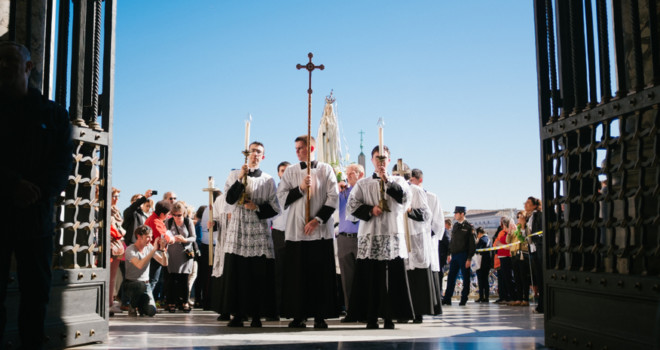It’s officially the heart of ordination season, and our family is attending our usual round of ordination Masses.
For the second year in a row, I am sewing a chasuble and stoles for some of my seminarian friends. If you have never sewn a chasuble, I can tell you that it is an act of love. It isn’t an easy task, but it also isn’t a task that you can take lightly. Throughout the whole process — from measuring the priest-to-be and adjusting the pattern for him, to picking out the fabric for his chasuble, to cutting out the pieces of fabric, and sewing the chasuble — I am praying for and holding that young man in my heart. It is an opportunity to practice spiritual motherhood, and I don’t take it lightly. As the fabric runs through my fingers, I think of the Masses that will be said while it is worn, and I am in awe that I get to play a small part in that sacrifice. Wrestling yards and yards of fabric and a finicky sewing machine becomes my sacrifice that I can unite to his.
The chasuble I am sewing is for a man who is a very dear
friend to our family, and one of my husband’s former seminarian students. We’ve
watched him grow into his vocation. We attended both his final vows and his
deaconate ordination, and now we will attend his priestly ordination. He’s
eaten dinner at our house, spent a year assigned to our parish for his pastoral
work, and was present at the funeral of our miscarried baby (as well as at the
baptism of the living baby that came after that little one).
A newly ordained priest is known as a “baby priest,” and
seminarians are like priests in utero. Not all of them make it to ordination,
as many discern that God is calling them elsewhere. When one of them does arrive at ordination, it is every
bit as emotional as birth.
As the wife of a seminary professor, and someone who spends a good amount of time with seminarians and the priests forming them, I have a unique opportunity to glimpse the future of the Church. That future is a bright one.
I know many incredible older priests (including one who was
recently made a bishop) and I am grateful for their beautiful witness to
fatherhood. In this article, though, I want to give you a glimpse at the
seminarians and newly ordained, a group that not everyone has an opportunity to
interact with.
Men with a Heart for Fatherhood
Recently, I was invited to be one of the speakers at a
Saturday workshop at the seminary. It was a workshop organized by the
seminarians, and they invited lay couples to come and speak to them about how
they could best serve families. Before I spoke to them, I asked people on
social media what they wanted to tell future priests, and I received a ton of
feedback. I typed up the responses and passed them on to the seminarians.
I was amazed by the humility these men showed. They eagerly
listened to critiques about what priests could do differently to better serve
families. They showed real care and concern for how to serve their future
parishioners.
I see the same sort of concern for every family that visits
the seminary. Many of the professors are lay men and women, and these mothers
and fathers sometimes bring their children to Mass or meals at the seminary.
They are always met with welcome. The seminarians want to get to know families,
to serve families, and to support families. They want to know what challenges
families face. I have sat and talked to seminarians about infertility,
difficult pregnancies, miscarriage, NFP, and family life, and they have eagerly
listened and asked questions. They want to know how to become fathers.
Many of the other faculty members are young, recently
ordained men. Our parish seems to be a sort of training parish for new pastors,
and our last two pastors have been first-time pastors. Between these two
groups, I’ve gotten to know many priests who are in the early years of their
priesthood. Like the seminarians (but even more so) these men, too, have a
desire to be real fathers. They will hear a Confession with little to no
notice. They visit the homes of parishioners, and happily cut up the kids’ food
so the parents can eat. They respond with welcome and joy to all of their
parishioners – from the elderly, to the toddlers, to the newly married couple
struggling with infertility.
Men of Faith
One of my favorite things to do is to go to Mass at the
seminary where my husband teaches. The chapel is beautiful, the music is
awe-inspiring, and the liturgy is beautifully celebrated. But what makes the
Mass truly special is getting to pray with the seminarians and priests who live
there. Our family usually sits in the back (because we have an energetic
toddler) which means that our view is of pews and pews of young men in albs and
surplices, chanting the antiphons and responses. When we go up to receive
Communion, we pass men who are deeply engrossed in their prayer after
Communion, and their love of Christ encourages me to love him more deeply.
But their faith doesn’t stop in the chapel. During our
weekly lunch at the seminary, I’ve had so many beautiful conversations with
these men about their faith and my faith. They rejoice to see the ways that God
is at work in my life, and I am filled with hope when I see the ways that he is
at work in theirs.
Men Familiar with Spiritual Battle
I remember the first time one of my close seminarian friends
was ordained a deacon. Around the same time, he was suddenly confronted with
several unusual sufferings, including having a parent diagnosed with cancer. As
he shared with me what he was facing, I said to him, “Oh my goodness. I can’t
believe that you are going through all of this, in this final year before
ordination. Spiritual attack is real.” He looked at me seriously and agreed.
The men who are entering seminary in the current culture are
faced with real, difficult spiritual battle. The society we live in does not
love or trust priests. In some circles of secular society, “priest” is
synonymous with “pedophile.” The men in seminary know that, but they are still
giving God their yes. Why? Because they want to bring Christ to others. They
want to give others hope.
These men — willing to suffer, eager to love the Church and Her children — are a sign of hope to our suffering Church. There may be a lot of suffering right now, but there is real hope for the future.
✠
image: PIGAMA / Shutterstock.com












